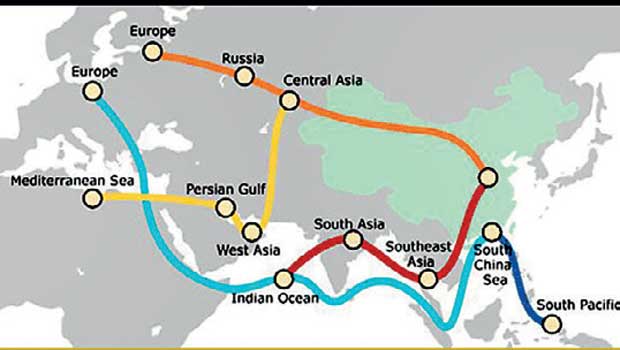15 May 2017 - {{hitsCtrl.values.hits}}

By David Vines
China’s Belt and Road Initiative (B&RI) offers a huge opportunity. It is true that there are risks. But it is clear what we should do. We should welcome the initiative with open arms and engage with it.
We have been here before. In 1945, the world was emerging from war and the crisis of the Great Depression. Many foresaw a return to closed economies and to authoritarianism, but the best looked back to the pre-World War I era of globalisation. Leaders in the United States and Britain reached out to create a liberal international order.
The task was to transfer prosperity from the United States to war-torn Europe and Japan. In the process a framework of international cooperation was created. The Organisation for European Economic Cooperation, now the OECD, brought policymakers together in a shared task. The result was a remarkable period of global economic growth that lasted 60 years.
In 2017, the world is also emerging from a crisis — the 2008 global financial crisis. Many aspiring policymakers are looking to protectionism and authoritarianism. But again, the best of our leaders know that outward-looking growth is possible and can be beneficial to all. Our task now is to continue the process of global development, to bring prosperity to the poorer regions of Asia, Latin America and Africa.
This task has become much more difficult now that US policymakers have retreated inwards. Until very recently, policymakers in Asia believed that the Trans-Pacific Partnership (TPP) would provide a framework in which domestic reforms could be pursued in an outward-looking manner, with the United States providing overall leadership.
There were faults with the TPP — one being that the United States sought to exclude China. But with the TPP currently in stasis and Europe looking inwards, those negotiating the Regional Comprehensive Economic Partnership (RCEP) now realise that, at least in Asia and the Americas, RCEP is the only remaining framework for driving forward international cooperation.
Will China be able to lead the global liberalisation process now that Washington has stepped back? Will the B&RI come to look like the Marshall Plan?
It is clear that there will eventually be a huge amount of money on the table for the B&RI — current estimates suggest a trillion dollars. China has also begun to create its own instruments of economic cooperation, including the Asian Infrastructure Investment Bank (AIIB). But will those who are creating the B&RI and the AIIB be able to work with RCEP parties to create a framework of international cooperation that benefits all?
There are two main risks.
The first risk concerns China’s own policy in developing the B&RI. Although China has described the initiative as inclusive and designed to create mutual benefit, this may not turn out to be the case. The AIIB may actually encourage those countries with which it carries out investment to look inwards or back towards China. The B&RI might conceivably become no more than a gigantic instrument of supply-chain management for China, creating the kind of jobs that drive an enormous Chinese production machine. These firms might pay low wages in the B&RI countries and might confine the resulting value-added to coastal China.
B&RI countries need to be free to use their newfound opportunities to trade and develop by engaging with the rest of the world. What is also required is that China cooperate with Washington to develop global technology, rather than engage in a technological battle with the United States.
The second risk concerns the policies that other countries have towards China. Many in Europe fear that China will use the B&RI in the way outlined above or fear that the initiative has long-term political and strategic implications for Europe itself. They are suspicious that China will seek to create political and economic dependencies among the poorer eastern EU states, using its massive infrastructure investments to exert political leverage.
These two risks go together. If the rest of the world refuses to cooperate with China, then China may decide to use its financial muscle in a way that only benefits itself.
A win-win outcome is possible. China is clearly new to the game of international economic leadership and Chinese leaders are only now beginning to learn how to act on the world stage. In this way, China is not unlike the United States in the early 20th century. Many in China want to lead well, for the benefit of the global economic community and not just for the benefit of China. It is up to the rest of the world to help show Chinese policymakers how to do this.
(David Vines is an Emeritus Fellow of Balliol College, Oxford and a
former Professor of Economics
at Oxford University)
25 Nov 2024 54 minute ago
25 Nov 2024 1 hours ago
25 Nov 2024 1 hours ago
25 Nov 2024 2 hours ago
25 Nov 2024 3 hours ago